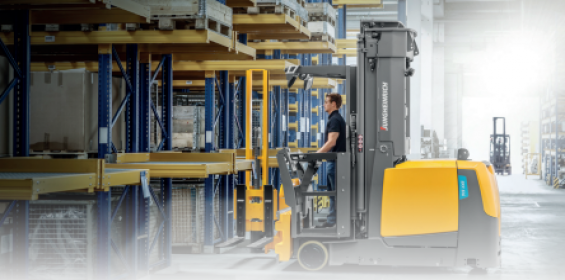The 2021 State of Manufacturing report found that most manufacturers believe that lessons from the pandemic have paved the way for innovation. Manufacturing companies are looking to future-proof their business into the post-pandemic era, with 89% outlining that sustainable manufacturing is a growing priority. Considering an alternative that fits these requirements for equipment that is vital to business operations should, therefore, be a priority for most manufacturers.
Taking into account the cost savings, efficiency gains and environmental benefits on offer, refurbished trucks are becoming increasingly popular. Refurbished forklift trucks can offer the highest standards of quality, reliability and safety while being a more responsible choice for the environment. It is essential however, that companies choose refurbished trucks that have been considerably processed so they can operate ‘as good as new’.
On average, the cost of a refurbished forklift is between 70-75% of a new truck. For SMEs especially, it offers a great potential to have the same high standard of quality without paying full price. But large ‘blue-chip’ businesses are also now buying refurbished trucks where the application is right in order to unlock the benefits and contribute towards their own sustainability goals.
Customer considerations
There are of course considerations when using or selling refurbished trucks to ensure that they operate at an acceptable standard. Whether a refurbished truck is actually the right route for the customer is the key question and suppliers must work with their customers to assess the responsibilities the truck will be undertaking.
For companies looking at an intensive operation, for example, where a forklift will be required to perform shift work all day every day, then a brand new truck is often a better fit. However, if a vehicle is to be used for five or six hours a day, such as at the end of a production line or for less intensive loading duties and yard work, or more occasional usage, then a highquality refurbished forklift truck may well be a more suitable option. As a rough guide, high quality second-life equipment should be ideal for a 1000 hr to 1500 hr application, but a good supplier will work consultatively on this, to establish the exact truck to meet a customer’s unique requirements.
Not all forklifts are refurbished to the same standard, and for those looking to invest in a refurbished truck, it’s crucial to look into the quality and value on offer. Suitable questions to ask include; How rigorous is the refurbishment process? How old is the forklift? How many hours has it worked? Is its full service history known? Customers must consider these questions in order to ensure that they are receiving the best standard refurbished truck possible.
Safety and sustainability
Safety is of utmost importance, so the question should also be asked: does the truck comply with the country specific health and safety regulations after refurbishing? Have the lifting chains and forks been inspected in line with industry regulations? Using an efficient production line process for example, can ensure that all parts of the truck, from the mast and motor to the chassis, are carefully cleaned and inspected for quality and safety.
The quality of a refurbished truck should appear no different to a new one. It should have the highest standards of safety and sustainability and it certainly shouldn’t be apparent that a truck is ‘used’ to the naked eye.
Moreover, refurbished trucks can also actively contribute towards a business’ CSR and sustainability goals, by capitalising on the benefits from a fleet or truck’s quality second life. This is particularly the case when refurbished equipment is powered by a technology that supports energy efficient operations, such as lithium-ion, that can unlock significant productivity, efficiency and cost benefits for organisations.
Maximising resources
The manufacturing industry has a chance to enter the post-pandemic era with the aim to become more innovative, sustainable and efficient. Choosing a refurbished truck means that customers can benefit from the same economic, technical and ecological advantages as they would from purchasing a new truck. By implementing refurbished forklift trucks, manufacturers can maximise the resources available without compromising quality or operational efficiencies – thereby future proofing their business now and for the future.
*Alexander Baal, director sales operations, Jungheinrich UK
https://twitter.com/JungheinrichUK
https://www.linkedin.com/company/jungheinrich-uk-ltd/

